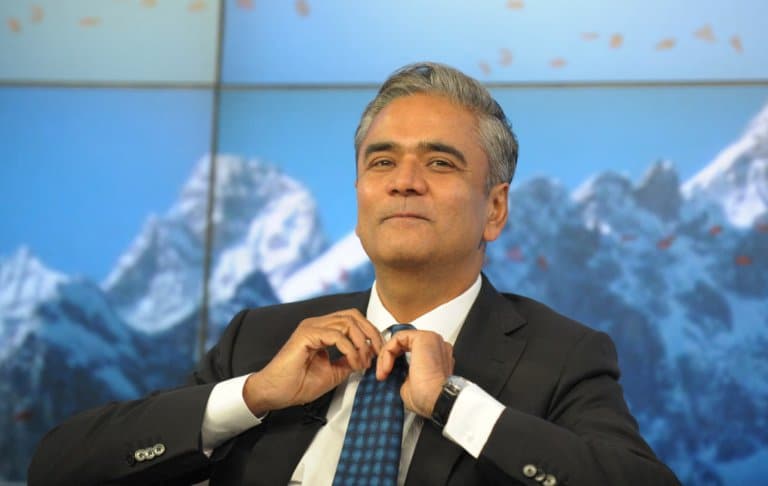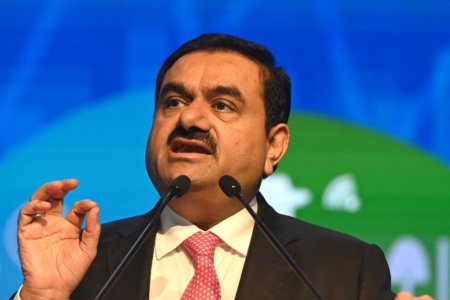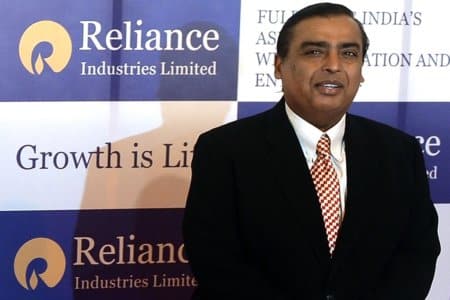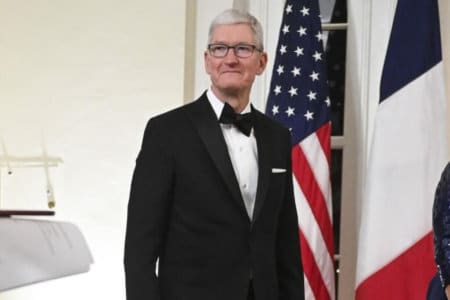
Anshuman Jain was the first non-European to head Deutsche Bank, a German financial institution that has a market capitalisation of US$21.5 billion.
Although he headed a German bank, he didn’t speak the language. Perhaps he didn’t need to as he was known to be calculative, smart, and looked the part.
The pioneer global banker was rarely seen out of a suit and spoke the same way he dressed: with tip-top precision.
Some were intimidated by him, others inspired.
When he passed at 59, the finance world mourned his loss. But more particularly, they grieved the influence, intellect, and courage that was exemplified in every role he took on.
“He did not achieve his full potential. He could have moved into the pantheon of finance if times had been just a little bit more fortunate for him,” he told The New York Times.
Indian CEOs are taking over the Western world
Barely a month goes by these days that you don’t read or hear about an Indian taking over a tech company (Satya Nadella) or acquiring large assets in multi-billion-dollar organisations (Tata Group).
Indians seem to be growing their influence to the highest levels of government and corporations in the Western world.
Some notable CEOs and leaders include:
- Sundar Pichai, CEO of Alphabet
- Neal Mohan, CEO of YouTube
- Laxman Narasimhan, CEO Starbucks
- Satya Nadella, CEO of Microsoft
- Shantanu Narayen, CEO of Adobe
- George Kurian, CEO of NetApp
- Parag Agrawal, CEO of Twitter
- Arvind Krishna, CEO of Microsoft
- Sonia Syngal, former CEO of Gap
- Rishi Sunak, UK’s prime minister

Like Anshuman Jain, CEO of Twitter Parag Agrawal faced backlash and criticism over his race. Source: Kevin Dietsch/Getty Images/AFP
But that’s not to say it didn’t come with a barrage of challenges. One of the main issues that Jain faced while working was racism.
During a tenure at Merrill Lynch, he reportedly had to contend with the largely Irish Catholic sales force.
They kept mistaking him for an IT guy, which was typical of people during that time to only see Indians as call centre employees or IT help.
But Jain didn’t let that affect him at all. Behaviour like that only pushed him further to excel at sales — making him one of the youngest-ever managing directors in the company.
Most Indian leaders face similar cases of racism in their journey to the top, particularly in tech.
In 2021, when newly appointed Twitter CEO Parag Agrawal announced he would be taking over from Jack Dorsey, a white man, he was racially abused on the platform.
Words like “curry” and “pajeet” were thrown about loosely; both are derogatory terms used for Indians.

Alphabet CEO Sundar Pichai has been criticised for not helping a Dalit scholar. Source: Josh Edelson/AFP
Meanwhile, Google CEO Sundar Pichai faced criticism for showing solidarity for George Floyd, an unarmed black man who was killed by US police.
Indians questioned why Pichai didn’t help with India’s migrant crisis, particularly after the death of Dalit scholar Rohith Vemula.
Vemula was a Dalit or “untouchable,” one of the lowest classes in India’s caste system.
He committed suicide following a suspension for raising “issues under the banner of the Ambedkar Students Association.”
B. R. Ambedkar is the law minister of the government of India (1947–51) and a revered leader of Dalits, who led the outlawing of discrimination against untouchables in the country’s constitution.
“Rohith Vemula was from undivided Andhra, your home state. Show solidarity with his mother. Do you have any diversity policy while recruiting in India,” asks another scholar, Dilip Mandal.
Gender biases also reared their ugly head, as Leena Nair will recount.
As the first Asian and first woman to become the Chief Human Resources Officer of Unilever, she faced ridicule from her own mother, who questioned her need to go to school.
From these stories, we know the struggle was real for them. The result of their determination?
They are worth millions of dollars today.
Likewise, Anshuman Jain faced difficulties that we can now be inspired by and learn from.

Anshuman Jain rubbed shoulders with other famous leaders like Germany’s Chancellor Angela Merkel. Source: Johannes EiseleI/AFP
Anshuman Jain’s strict Jain childhood
Anshuman Jain was born in January 1963 in Jaipur, India to a civil servant father Ambu Jain, and mother Shashi Jain.
His father worked with the Indian Audit and Accounts Service, which posted him to a new place every three years.
He had a brother called Ashwin Jain, who is still alive today.
His family practised Jainism, one of the oldest religions in India.
Jainism teaches enlightenment can be achieved through nonviolence, especially to plants and animals so they all grew up as people-loving, peaceful vegetarians.
His family followed its teaching diligently and was strict about it, a practice he took with him throughout adulthood despite living abroad.
When he was six years old, he moved to Delhi with his father, who was now a bureaucrat, and attended the Delhi Public School at Mathura Road.
His friend Tunku Varadarajan writes that Jain’s formative years couldn’t have been any more different than the heights he reached, golfing with Bloomberg or rubbing shoulders with Merkel.
“In high school, Anshu and I would often spend our break time in search of some moneyed Punjabi classmate from Karol Bagh from whom we could cadge ice cream or Campa-Cola,” he wrote.
After high school, he attended the Shri Ram College of Commerce, New Delhi to study economics and graduated in 1983.
This is also where he met his future-wife-to-be Geethika with whom he would stay married until he passed last year.
Knowing he had found his soul mate in Geethika, he decided to follow her and her family to the US.
Not satisfied with just a degree, he then proceeded to explore an MBA at the University of Massachusetts, Amherst.
He was only 20 years old then.

Anshuman Jain made the trip from Jaipur to the pinnacle of Europe’s financial sector. Source: Daniel Roland/AFP
UMass Amherst’s MBA: Top-ranked and fully-funded
The UMass Amherst MBA may be ranked 69th worldwide according to Financial Times, yet it’s free.
That’s thanks to the Isenberg MBA Fellowship that provides full funding for every on-campus MBA student — in exchange for 10 hours of work per week over a 39-week academic year.
The fellowship includes the following:
- full tuition support
- an annual stipend
- health insurance
The programme has four focus areas that pair well with its range of electives (such as Project Management and Negotiation, and Data Mining and Alternative Investments):
- Business Analytics
- Financial: Asset Management
- Healthcare Administration
- Management & Entrepreneurship
The MBA can be converted into dual degrees in Sport Management, Business Analytics, Public Policy, and Engineering as well.
How Anshuman Jain became Europe’s most powerful banker
After completing his MBA, Jain began his career in finance at the securities firm Kidder, Peabody & Co., but soon moved to Merrill Lynch.
Here, he faced trying times, including racism, but he continued to pursue his dream.
This is when he also met the late Wall Street legend Edson Mitchell, with whom he learned the ropes and began building networks.
In 1995, at the age of 32, Jain was part of a group that was poached by the German bank Deutsche. He said yes.
Jain hit the ground running and was soon known for being an expert in the expanding hedge fund sector.
He built different trading floor styles, pushed the sales teams to be more aggressive, and taught the team to know when to walk away from bad deals.
His management style was very Darwinian, according to his peers.
Darwinism is a theory that says all species arise and develop through the natural selection process of small variations that increases one ability to compete, survive, and reproduce.

Anshuman Jain had strong work ethics that followed him throughout his life. Source: Dia Dipasupil/ Getty Images/AFP
And that is what Jain used to do; he’d form smaller teams to focus on one business area and allow them to compete.
“Anshu was a killer. He always had a knife between his teeth,” remembers an employee.
The trades that Jain made popular earned the bank millions, and by the mid-2000s, the businesses he ran were across the board, from capital markets sales to credit derivatives.
As his influence continued to grow in the investment bank, Jain found himself surrounded by a team of loyal employees that were soon known as “Anshu’s army”.
When the financial crisis hit its peak in 2008, Jain had already built an undisputed trading powerhouse. His team remained resilient while other financial sectors drowned.
He was appointed to Deutsche Bank’s Management Board in 2009 and was responsible for the Corporate and Investment Bank division from 2010.
Then from 2012 to 2015, he was co-CEO.
Although racism was still very much a part of Jain’s life, he kept his head high.

Anshuman Jain was the first non-European head of Deutsche Bank and did not speak the German language. Source: Spencer Platt/Getty Images/AFP
From racism to a fatal cancer
In almost every news article, Jain was pointed out as an Indian by the local media. At the bank, scandals piled up.
There were issues of Donald Trump defaulting on bond payments. The bank was caught manipulating the London Interbank Offered Rate.
By mid-2015, the pressure was too much and the stakes too high — Jain decided to step down, and a new co-chief executive was appointed.
And in 2017, he was diagnosed with duodenal cancer, given only one year to live.
Jain took it upon himself to begin conducting exhaustive research into cures, and whatever he did must have worked.
He outlived the doctor’s prognosis by four years and lived a fulfilling life to the end.
He was remembered as a kind man, someone who helped young Indians succeed by advising them on how to dress and fit in with society in London.










